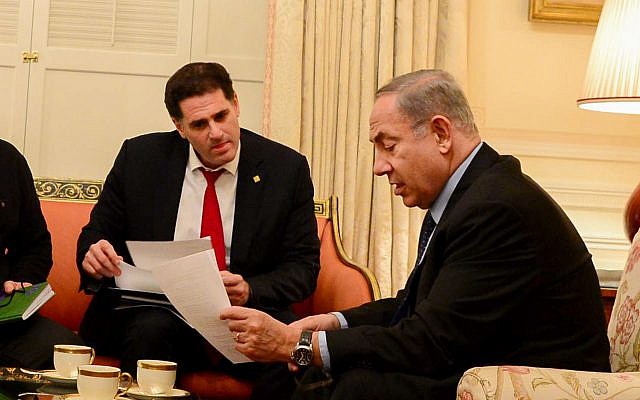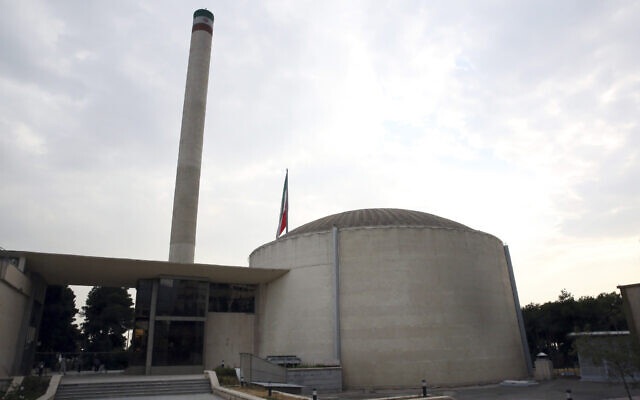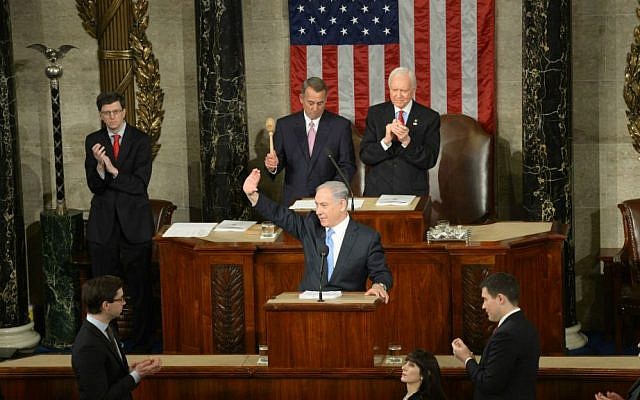Dermer, said to be top foreign minister pick, heard bashing Biden ‘weakness’ on Iran
The reported leading candidate to become Israel’s next foreign minister made comments harshly critical of US President Joe Biden’s administration and its policies toward Iran on a recent podcast, possibly complicating any efforts the incoming government might make to repair frayed ties between prime minister-designate Benjamin Netanyahu and Democrats in Washington.
Ron Dermer, a former Israeli ambassador to the US, accused the White House of “project[ing] tremendous weakness,” “handcuffing Israel,” being “hellbent” on reaching a nuclear deal, and “wrong fundamentally strategically” by trying to negotiate in order to avoid an armed clash with Iran.
Dermer, who helped engineer Netanyahu’s ill-fated attempts to bypass the Barack Obama White House and argue against the deal directly to Congress and American voters, also pushed for a resumption of that strategy, indicating that he may pursue the same tack despite the fact that it led to what some described as a low-point in ties between Jerusalem and Washington.
“The administration of president Biden does not have a policy to prevent Iran from developing nuclear weapons. They have a policy to contain a nuclear Iran,” Dermer said on the Diplomatically Incorrect podcast alongside Michael Makovsky, head of the Jewish Institute for National Security of America, a hawkish think tank based in Washington.
“The goal from them is to avoid a military confrontation at all costs. If you ask the senior people in the Biden administration which of these two scenarios is worse, a military confrontation with Iran or a nuclear-armed Iran, they will say a military confrontation is worse,” he said.
Get The Times of Israel’s Daily Edition
by email and never miss our top stories
By signing up, you agree to the terms
The podcast aired on August 26, when the US and Iran appeared to be mere days away from reaching a deal to revive the 2015 Joint Comprehensive Plan of Action, which curbed Iranian nuclear activity in exchange for sanctions relief. Dermer’s comments drew little attention at the time, but have taken on additionally relevancy since his name emerged this week as a leading candidate for Israel’s top diplomatic post as Netanyahu puts together a coalition with his right-wing and ultra-Orthodox political allies.
Efforts to renew the deal, which former US president Donald Trump pulled the US out of in 2018, fizzled out in September and Washington now says it is not focused on negotiating with Iran amid widespread protests and a brutal crackdown there.
The Coburg Palais, the venue of the Joint Comprehensive Plan of Action (JCPOA) revival talks, in Vienna on November 29, 2021. (VLADIMIR SIMICEK / AFP)
The US-born Dermer, a close confidant of Netanyahu, described the administration’s commitment to trying to negotiate a deal as wrongheaded, claiming it would make armed conflict more likely by removing the deterrent effects of a credible military threat.
“Not only are they wrong tactically, they are also wrong fundamentally strategically, because the deal they are putting in place is a path to war,” he claimed, calling a nuclear deal “a threat to the survival of Israel.”
“You have to have clear red lines with Iran,” he added. “The problem we have now is the worst fear of the Biden administration is a potential military confrontation with Iran. … Anybody with an IQ above a speed bump gets that that’s how it works in the real world.”
“And the Israeli policy makers don’t seem to understand there is no Plan B because they are opposed to any military confrontation, so they are not going to work with Israel … seriously on contingency planning, other than to put handcuffs on Israel doing military operations,” Dermer charged.

Prime Minister Benjamin Netanyahu (R) with Israel’s Ambassador to the US Ron Dermer, at the president’s guest house, in Washington, DC, February 14, 2017. (Avi Ohayon/GPO)
He described the fact that negotiations were taking place despite belligerent Iranian actions, like the stabbing of author Salman Rushdie due to an Iranian fatwa on his head, as “obscene,” accusing the administration of “almost begging for a deal.”
“Have a sense of honor. You’re the superpower of the world, and an 8th-rate power is trying to kill people on your soil and you’re sitting down and negotiating with them,” he said. “But when you are just doing nothing in response to these provocations, I just think it projects tremendous weakness.”
Dermer also pointed to talk of a “longer, stronger deal,” initially espoused by US Secretary of State Antony Blinken, as “absurd.”
“Somehow magically, with fairy dust, they are going to convince Iran to do a longer and stronger deal,” he asked rhetorically.

This September 1, 2014 file photo, shows a nuclear research reactor at the headquarters of the Atomic Energy Organization of Iran. (AP Photo/Vahid Salemi, File)
And he accused the administration of not actually seeking to keep Iran from getting a bomb, noting the fact that curbs on enrichment will be lifted over the next several years under the agreement.
“For an administration that wants to just bury their head in the sand, kick this can down the road and just say ‘well you know in 2 years in 6 years its gonna be somebody else’s problem,’ It’s a good deal from their point of see,” he said.
Many of Dermer’s comments echoed talking points espoused by him and Netanyahu as the Obama administration advanced toward the JCPOA, which was also signed by five other world powers.

President Barack Obama, accompanied by Vice President Joe Biden, speaks Wednesday, Nov. 9, 2016, in the Rose Garden of the White House in Washington. (AP Photo/Pablo Martinez Monsivais)
Their attempts to push the US away from a deal ended up having an opposite effect, according to a number of US lawmakers and others familiar with the thinking in Washington at the time.
A March 2015 address to Congress against the JCPOA by Netanyahu, orchestrated by Dermer and House speaker John Boehner, infuriated Democrats, who saw it as a major snub of Obama on his home turf.
One senior Democratic Congressional aide called the speech and the way it came about the “most damaging moment in the history of the bipartisan relationship between the US and Israel.”

Prime Minister Benjamin Netanyahu addresses a joint meeting of Congress, Washington DC, March 3, 2015. (photo credit: Amos Ben Gershom/GPO)
It is still considered a watershed moment in the relationship between Netanyahu’s administration and Democrats, and some have expressed concerns that that bad blood could linger once Netanyahu assumes power.
Nonetheless, Dermer argued that the strategy was correct, complaining that attempts to make arguments behind closed doors fell on deaf ears from the Obama administration.
“They weren’t listening. The way you’re going to shift policy is you have to take your case to the American people. it’s a democracy,” he argued, criticizing Prime Minister Yair Lapid and former premier Naftali Bennett for trying to minimize friction with the US.
“The relationship between the US and Israel is strong enough that the prime minister, on an issue that is an existential issue, a threat to the survival of the country, can publicly make his case,” he said.



Comments are closed.